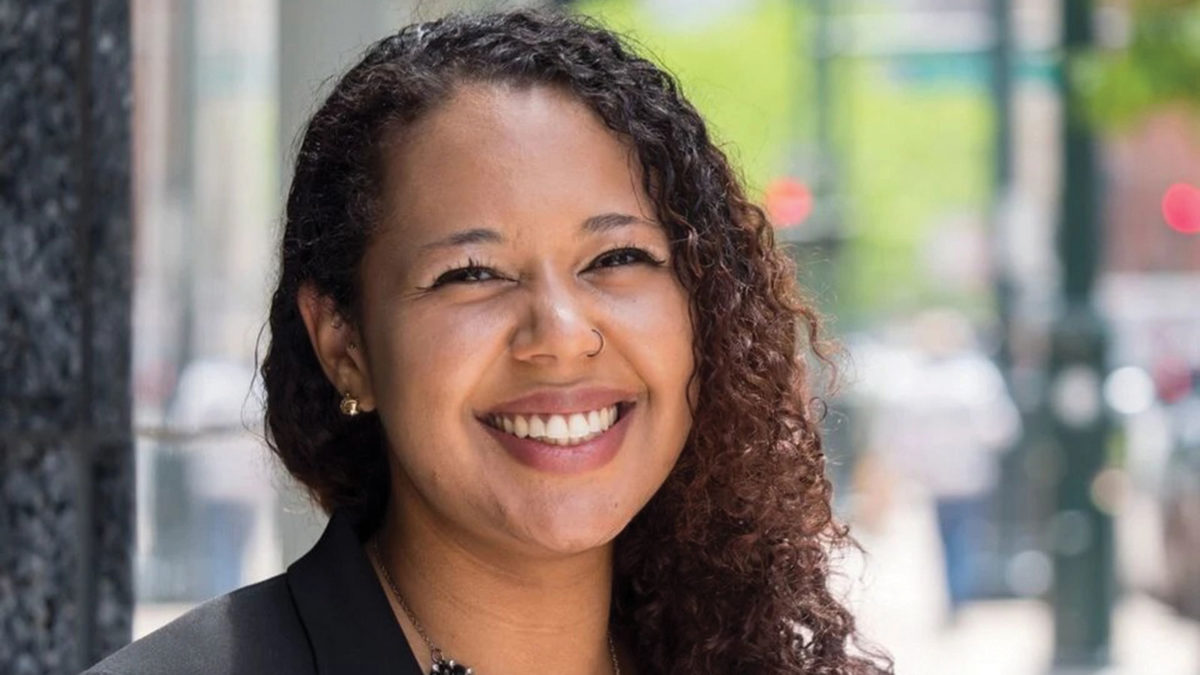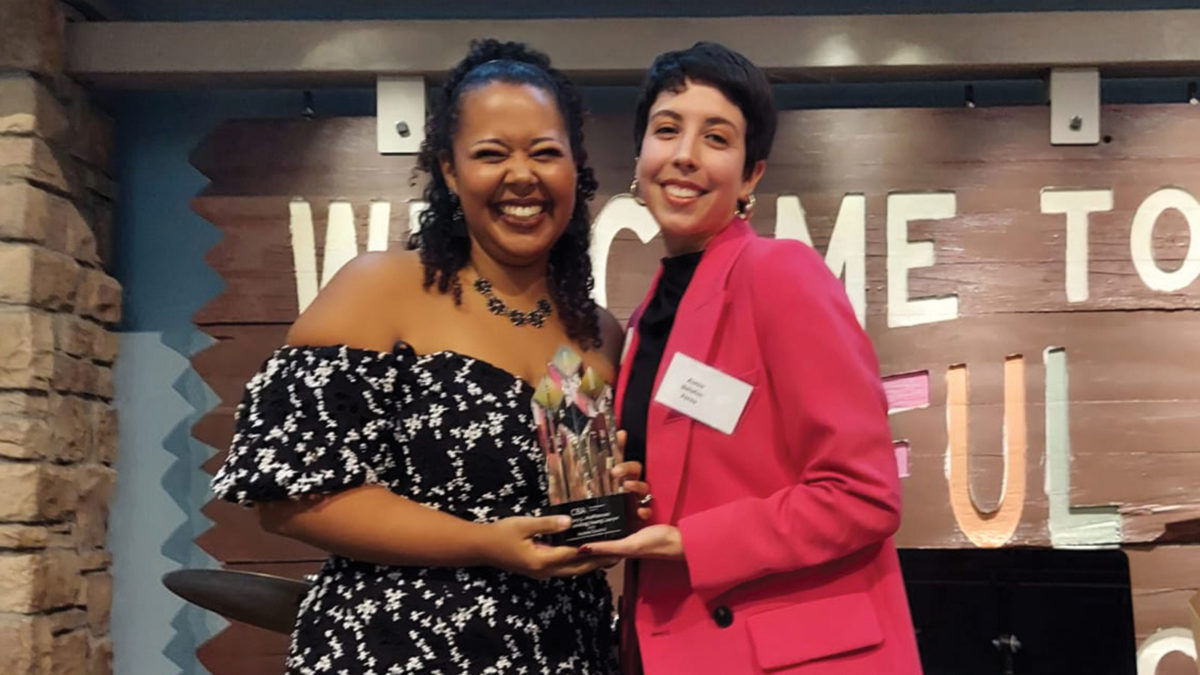
Making It Personal
Outstanding Young Lawyer Award Recipient Kiki Council Discusses Her Path to Reproductive Rights Activism
March 2023
Download This Article (.pdf)
If there’s one thing that Kiki Council, this year’s Gary McPherson Outstanding Young Lawyer of the Year, knows, it’s that networking is everything in the legal profession. “I love to tell law students that my journey to working in the reproductive justice space is a great example of the importance of maintaining professional networks,” she says.
“In spring 2021, I was still litigating and trying to figure out how to springboard myself into the reproductive justice movement. A good friend from UChicago, Amanda Bennett, had been working in the movement for several years and was—and still is—working at an organization called the Digital Defense Fund, which provides digital security support for the abortion movement. Amanda reached out one day with a job posting for a staff attorney position at DDF’s sister organization, the Forefront Project.”
The position would be a stretch for Council, but she embraced it, confident she could get up to speed as she completely switched up her legal practice. The Forefront Project advises 501(c)(3) public charities that do reproductive rights, health, and justice work on how to remain (c)(3) compliant in their advocacy work, a radical departure from Council’s employment litigation defense work, but this kind of advocacy work was something she felt called to do. So, she pushed ahead with what she wanted.
Council has since been able to leverage that experience into a new position at The Lawyering Project as Legal Counsel for Pro Bono Initiatives. The Lawyering Project works to eliminate laws that undermine reproductive rights, health, and justice that deprive people of moral agency and control over their bodies while compounding other forms of oppression, including racism, sexism, and poverty. She is currently working to create a nationwide network of attorneys who are willing to provide pro bono legal services to the reproductive justice movement.
This attitude of forging ahead to follow not the easiest path, but the path that feels right, is much the same attitude that brought Council to law school in the first place. Although she knew lawyers from her church when she was growing up (and, unfortunately, due to abuse and neglect, the state getting involved in her relationship with her biological father), Council says, “I’m a first-generation lawyer. When I was finishing up my undergraduate degree, I actually struggled with whether I should continue on in academia and pursue a PhD or if I should get a master’s in public policy and administration, public health, or something similar.”
It wasn’t until she took a gap year following her undergrad that Council had significant exposure to the legal profession. “I worked at a small plaintiffs’-side law firm that represented unions in Chicago’s West Side and decided that year to give law school a shot. I wish I had been better informed about the actual costs—emotional, physical, and financial—of law school at the time, but I don’t regret my decision to attend law school because that led me to do what I do now.”
During her time at the University of Colorado, Council admits she was “the ultimate over-committed, too-busy law student.” She was involved in the Law Students for Reproductive Justice (now If/When/How), the ACLU, the Black Law Student Association, Barristers’ Council, the Colorado Technology Law Journal, and the Student Bar Association. “Just seeing it all typed all out makes me exhausted—I don’t know how I juggled all these things with classes,” she says.
“I did know that I wanted to focus on social justice in law school, but finances were always a concern for me. I had a perception that I would not be able to make enough money to live and pay off my loans if I went straight into social justice work, so I started out first at a clerkship with Judge Eid on the US Court of Appeals for the Tenth Circuit, and then joined the Commercial Litigation Practice Group at Holland & Hart. There, I got involved almost immediately in judicial bypass petitions, representing minors who wanted abortions without forced parental involvement.”
This work was personal for Council. “I had a difficult childhood and was harmed by adults who were in positions of trust and care. Given my upbringing, I understand implicitly that these young people are in the situations they are in because they do not have a trusted or safe/secure adult in their lives. Having to do a judicial bypass petition in and of itself indicates a critical failure of care for these young people. All they really need is someone who is nonjudgmental, stable, and trustworthy to listen to them and their needs. That’s what I needed when I was a young person, and it’s a basic need most humans have and deserve to have met but often do not get. I tell each young person that I’m here to help them have a full spectrum of choices in their healthcare, and that I hate that the law is subjecting them to what they’re about to go through. It’s hard sometimes to separate the professional and personal because I see myself in so many of these clients, but I do my best!”
As time went on, Council realized that she enjoyed her social justice work so much more than anything else she was doing. “The pandemic and the George Floyd protests in Summer 2020 were pretty impactful in terms of me figuring out what I really wanted to ‘do’ with my life, my energy, and my legal degree. I realized in a way that I was wasting my talents and passions by not being fully participatory in social justice work. On a more personal level, it made me seriously think about the importance of family and friends in my life. Lots of old, bad habits and relationships died with the pandemic, and I think that was for the best, despite the overall societal trauma that I think we all felt as a result of the pandemic.”
The recent overturning of Roe v. Wade has made Council’s work that much more complex. “The loss of Roe had and continues to have massive ripple effects across the United States because abortion is now again a state issue. Fifty states means fifty separate legal regimes about every little law that touches the issue of abortion, including standard abortion restrictions like gestational age bans, to other areas of law, such as telemedicine, laws around self-managed abortion, insurance, licensure, various public health laws, as well as criminal codes. And because it touches so many disparate legal issues, it’s been very difficult to find and coalesce legal resources, particularly free legal services.” But rather than letting the complexity overwhelm her, Council says, “I see all of the chaos as a moment of opportunity. Roe v. Wade was not necessarily good law or a good way to structure abortion rights and access. We now have an opportunity to do everything over again, in a better way. I hate how much people have to suffer in the meantime, but I’m thankful for the extremely hard work by abortion providers, practical support organizations, and others in the movement to help people get the healthcare they deserve while we figure out how to move forward.”
Council, a Denver native, did her undergrad and spent a gap year in Chicago, but she always knew she wanted to come back to start her career and eventually a family in Colorado. Her family is in Colorado, including three of her biggest supporters, her mother (“one of my earliest professional role models. She was a single parent and a woman who worked in a very male-dominated field. She built her career from basically nothing, worked extremely hard, and was still somehow able to cook a homemade dinner every night for me and my siblings”); her grandmother (“we call her yiayia”); and her sister Lula. “The volume of emotional support alone they’ve all three provided me over my schooling years and career is immeasurable, and I love them all so much!”
And then there was the matter of those brutal Midwestern winters that had Council missing the sun. “What really did it for me, honestly, was the polar vortex in 2014. I couldn’t imagine trying to take care of kids and get them to school and various activities on the El with that kind of weather!”
When she’s not on the clock, Council and her husband, Jack, whom she met in Chicago in 2012, enjoy live music (Jack is in a local band called Hello, Mountain). During the pandemic they even managed to stay connected to the local music scene by joining several artists and musicians on Zoom concerts hosted from their homes or small, empty venues. “Local artists and bands are making their way back to local venues—we’ve been to some great shows recently,” she says. “As soon as we were vaccinated and able to travel, we started going to festivals again, the first one being Furnace Festival in Birmingham, Alabama, in September 2021.”

A year later, Council would find herself at a celebration much closer to home—the Colorado Bar Foundation’s Annual Bar Fellows Dinner—to receive the 2022 Gary McPherson Outstanding Young Lawyer Award. She’s pictured above accepting the award from Aurea Bolaños Perea of COLOR (the Colorado Organization for Latina Opportunity and Reproductive Rights). The CBA congratulates Council on her achievement and is proud to add her to its distinguished list of award recipients.


